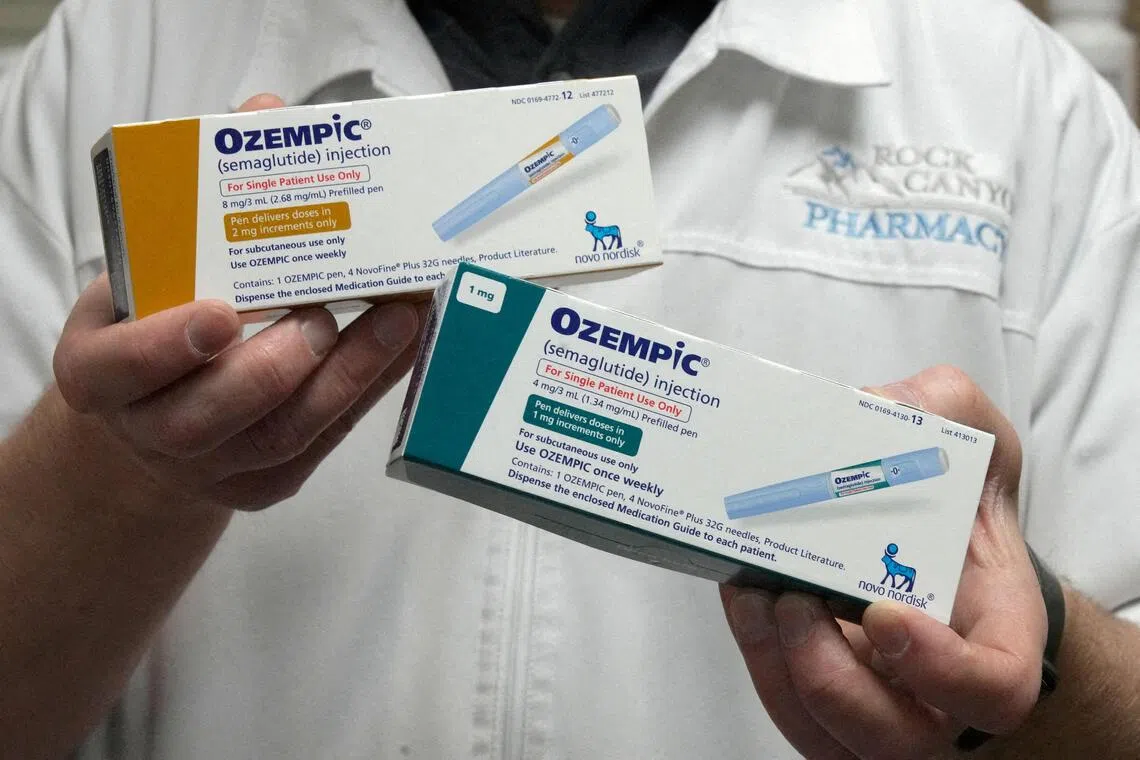Obesity drug study points to effectiveness in curbing addictions
Sign up now: Get ST's newsletters delivered to your inbox

A study of Ozempic, Mounjaro, and other diabetes and obesity drugs, published in the journal Nature Medicine, found protective effects related to impulse control.
PHOTO: REUTERS
NEW YORK – One of the world’s largest studies of Ozempic, Mounjaro and other blockbuster diabetes and obesity drugs highlighted their impact on the brain, pointing to benefits over conditions from addiction to schizophrenia.
The research tracked the effects of a class of drugs called GLP-1 receptor agonists on diabetic US veterans for up to five years, making it one of the most extensive so far on a class of medicines that includes Novo Nordisk’s Wegovy and Eli Lilly & Co’s Zepbound.
The study, published on Jan 20 in the journal Nature Medicine, found protective effects related to impulse control, adding to evidence that the drugs may not only suppress appetite but also help curb alcoholism and other addictions.
“These drugs are helping us uncover the real underpinnings of obesity,” said co-author Ziyad Al-Aly, director of the Clinical Epidemiology Centre at the Veterans Affairs St Louis Health Care System.
“Effectively treating obesity requires drugs that address the root cause: addictive-like behaviour towards food,” he said. “This may explain why GLP-1s have been so spectacularly successful as anti-obesity medicines, while many previous treatments that didn’t target the addiction pathway have failed miserably.”
The findings support ongoing research into the medicines’ potential for treating opioid- and cocaine-use disorders, further broadening the scope of these drugs, which Bloomberg Intelligence estimates will reap over US$93 billion (S$126.5 billion) globally by 2030 for obesity alone.
Dr Al-Aly’s earlier research mined the Veterans Affairs’ extensive databases to uncover links between prolonged use of popular heartburn medications and kidney damage, as well as the long-term health impacts of Covid-19.
The latest study analysed almost 216,000 patients taking GLP-1s for a median of 3.7 years, examining associations with 175 health outcomes and comparing results to those of patients on other diabetes drugs or receiving standard care for the metabolic disorder.
The study is notable for examining a broad range of medical conditions, said Dr Christian Hendershot, director of clinical research at the University of Southern California’s Institute for Addiction Science in Los Angeles.
“It doesn’t prove anything about causality, as the authors acknowledge, but it’s a nice starting point for narrowing in on which classes of disorders we might want to study,” said Dr Hendershot, who is researching GLP-1s for addictions to nicotine and alcohol.
Kidney stones
The results consistently showed both benefits and risks beyond those currently recognised, according to Dr Al-Aly. Drawbacks included an increased likelihood of drug-induced acute pancreatitis or inflammation of the pancreas, low blood pressure, fainting, arthritic conditions and kidney stones.
On the benefits side, GLP-1s were linked to a reduced risk of alcohol, cannabis, opioid, and stimulant-use disorders as well as neurocognitive disorders such as Alzheimer’s and dementia.
The study “provides an interesting analysis”, but its focus on mostly white male veterans may limit how well the findings apply to others, said obesity expert Margaret Morris, a professor of pharmacology at Sydney’s University of New South Wales.
Widespread use of GLP-1s, reported to be taken by as many as 25 million American adults, could cut alcohol consumption in the US by up to 29 million litres in 2025, according to a report from BMI Country Risk & Industry Research.
Suicide risk
Initial concerns about suicidal thoughts among users led to a review by the European Medicines Agency, which found no causal link. Dr Al-Aly’s study supports these findings and aligns with research suggesting GLP-1s may have anti-depressive effects and reduce the risk of intentional self-harm.
The results should offer reassurance about safety for people with mental illness, said Dr Dan Siskind, a professor of psychiatry at the University of Queensland.
University of Toronto’s associate professor of psychiatry Rodrigo Mansur said: “The only way to determine whether these medications help with mental health issues is through more targeted clinical studies.”
He is set to report results in 2025 from a mid-stage trial testing an oral form of semaglutide – the active ingredient in Wegovy and Ozempic – as an adjunct therapy for overweight patients with depression.
“We’re especially interested to see if it improves cognition – people’s ability to think, concentrate, and remember – which is a major gap in depression treatment,” he said. Bloomberg


